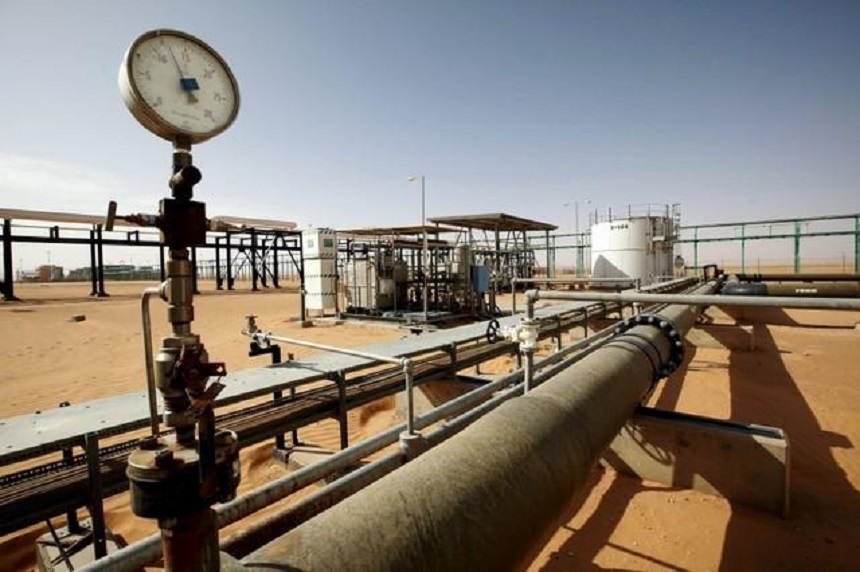Economy
Restart of Libyan Crude Production Weighs Down Prices by 3%

By Adedapo Adesanya
Oil prices slid more than 3 per cent on Monday over fears of increased global supply following news that Libya will resume oil production since January after oil export terminals and oilfields were blocked due to conflict.
Brent crude fell $1.36 or 3.15 per cent to $41.79 per barrel while the United States West Texas Intermediate (WTI) crude shed 3.48 per cent or $1.43 to close at $39.68 barrel.
Libya’s National Oil Corporation will restart production from certain fields and some exports of crude oil, the company said, adding that it will only restart production at safe fields and exports from safe ports.
The resumption of Libyan oil flowing to the global market at a time of weak demand recovery and weak oil prices was not a piece of news welcomed by market participants with open arms.
It has the possibility to bring back 1.2 million barrels per day to the market from just about 100,000 barrels it is currently. The scale-down happened in January when General Khalifa Haftar’s Libyan National Army (LNA) occupied the African producer’s oilfields, effectively blocking the North African country’s black gold.
But now that Libya will start bringing production back on, things may well change as the agreement by the Organisation of the Petroleum Exporting Countries and its allies (OPEC+) relied on the country’s involuntary contribution to the overall supply curbs.
Analysts noted that there will be a gradual ramp-up of Libyan supply starting from the end of the month to 650,000 barrels a day in early 2021, a level below pre-crisis levels of 1.2 million barrels a day, based on earlier reports of damaged infrastructure.
This means Libya is set to add 230,000 barrels a day on average over the fourth quarter of 2020, with the possibility of ramping up production above this as they will be spared from the OPEC+ cuts.
Also, depressing prices on Monday were reports of rising coronavirus cases in Europe, which means already affected demand will be further impacted by the possible renewal of restrictions on activities on the continent.
Also, in the United States, Tropical Storm Beta is forecast to move toward the central coast of an oil state, Texas. Natural disasters normally prop up prices but the Gulf of Mexico region is still recovering from back-to-back hurricanes, following Hurricane Laura in late August and Hurricane Sally last week. As of Monday, more than 10 per cent of the region’s oil production remained shut-in.
Economy
TotalEnergies Sells 10% Stake in Renaissance JV to Vaaris

By Adedapo Adesanya
TotalEnergies EP Nigeria has signed a Sale and Purchase Agreement with Vaaris for the divestment of its 10 per cent non-operated interest in the Renaissance JV licences in Nigeria.
The Renaissance JV, formerly known as the SPDC JV, is an unincorporated joint venture between Nigerian National Petroleum Company Limited (55 per cent), Renaissance Africa Energy Company Ltd (30 per cent, operator), TotalEnergies EP Nigeria (10 per cent) and Agip Energy and Natural Resources Nigeria (5 per cent), which holds 18 licences in the Niger Delta.
In a statement by TotalEnergies on Wednesday, it was stated that under the agreement signed with Vaaris, TotalEnergies EP Nigeria will sell its 10 per cent participating interest and all its rights and obligations in 15 licences of Renaissance JV, which are producing mainly oil.
Production from these licences, it was said, represented approximately 16,000 barrels equivalent per day in company’s share in 2025.
The agreement also stated that TotalEnergies EP Nigeria will also transfer to Vaaris its 10 per cent participating interest in the three other licences of Renaissance JV which are producing mainly gas, namely OML 23, OML 28 and OML 77, while TotalEnergies will retain full economic interest in these licences, which currently account for 50 per cent of Nigeria LNG gas supply.
Business Post reports that the conclusion of the deal is subject to customary conditions, including regulatory approvals.
“TotalEnergies EP Nigeria has signed a Sale and Purchase Agreement with Vaaris for the sale of its 10 per cent non-operated interest in the Renaissance JV licences in Nigeria.
“Under the agreement signed with Vaaris, TotalEnergies EP Nigeria will sell to Vaaris its 10 per cent participating interest and all its rights and obligations in 15 licences of Renaissance JV, which are producing mainly oil. Production from these licences represented approximately 16,000 barrels equivalent per day in the company’s share in 2025.
“TotalEnergies EP Nigeria will also transfer to Vaaris its 10 per cent participating interest in the 3 other licenses of Renaissance JV, which are producing mainly gas (OML 23, OML 28 and OML 77), while TotalEnergies will retain full economic interest in these licenses, which currently account for 50 per cent of Nigeria LNG gas supply. Closing is subject to customary conditions, including regulatory approvals,” the statement reads in part.
The development is part of TotalEnergies’ strategies to dump more assets to lighten its books and debt.
Economy
NGX RegCo Revokes Trading Licence of Monument Securities

By Aduragbemi Omiyale
The trading licence of Monument Securities and Finance Limited has been revoked by the regulatory arm of the Nigerian Exchange (NGX) Group Plc.
Known as NGX Regulations Limited (NGX Regco), the regulator said it took back the operating licence of the organisation after it shut down its operations.
The revocation of the licence was approved by Regulation and New Business Committee (RNBC) at its meeting held on September 24, 2025, a notice from the signed by the Head of Market Regulations at the agency, Chinedu Akamaka, said.
“This is to formally notify all trading license holders that the board of NGX Regulation Limited (NGX RegCo) has approved the decision of the Regulation and New Business Committee (RNBC)” in respect of Monument Securities and Finance Limited, a part of the disclosure stated.
Monument Securities and Finance Limited was earlier licensed to assist clients with the trading of stocks in the Nigerian capital market.
However, with the latest development, the firm is no longer authorised to perform this function.
Economy
NEITI Advocates Fiscal Discipline, Transparency as FG, States, LGs Get N6trn in Three Months

By Adedapo Adesanya
The Nigeria Extractive Industries Transparency Initiative (NEITI) has called for fiscal discipline and transparency as data showed that federal government, states, and local governments shared a whopping N6 trillion Federation Account Allocation Committee (FAAC) disbursements in the third quarter of last year.
In its analysis of the FAAC Q3 2025 allocation, the body revealed that the federal government received N2.19 trillion, states received N1.97 trillion, and local governments received N1.45 trillion.
According to a statement by the Director of Communication and Stakeholders Management at NEITI, Mrs Obiageli Onuorah, the allocation indicated a historic rise in federation account receipts and distributions, explaining that year-on-year quarterly FAAC allocations in 2025 grew by 55.6 per cent compared with Q3 of 2024 while it more than doubling allocations over two years.
The report contained in the agency’s Quarterly Review noted that the N6 trillion included 13 per cent payments to derivative states. It also showed that statutory revenues accounted for 62 per cent of shared receipts, while Value Added Tax (VAT) was 34 per cent, and Electronic Money Transfer Levy (EMTL) and augmentation from non-oil excess revenue each accounted for 2 per cent, respectively.
The distribution to the 36 states comprised revenues from statutory sources, VAT, EMTL, and ecological funds. States also received additional N100 billion as augmentation from the non-oil excess revenue account.
The Executive Secretary of NEITI, Mr Sarkin Adar, called on the Office of the Accountant General of the Federation, the Revenue Mobilisation Allocation and Fiscal Commission (RMAFC) FAAC, the National Economic Council (NEC), the National Assembly, and state governments to act on the recommendations to strengthen transparency, accountability, and long-term fiscal sustainability.
“Though the Quarter 3 2025 FAAC results are encouraging, NEITI reiterates that the data presents an opportunity to the government to institutionalise prudent fiscal practices that will protect the gains that have been recorded so far in growing revenue and reduce vulnerability to commodity shocks.
“The Q3 2025 FAAC results are encouraging, but windfalls must be managed with discipline. Greater transparency, realistic budgeting, and stronger stabilisation mechanisms will ensure these resources deliver durable benefits for all Nigerians,” Mr Adar said.
NEITI urged the government at all levels to ensure the growth of Nigeria’s sovereign wealth and stabilisation capacity, by committing to regular transfers to the Nigeria Sovereign Wealth Fund and other related stabilisation mechanisms in line with the fiscal responsibility frameworks.
It further advised governments at all levels to adopt realistic budget benchmarks by setting more conservative and achievable crude oil production and price assumptions in the budget to reduce implementation gaps, deficit, and debt metrics.
This, it said, is in addition to accelerating revenue diversification by prioritising reforms that would attract investments into the mining sector, expedite legislation to modernise the Mineral and Mining Act, support reforms in the downstream petroleum sector, as well as the full implementation of the Petroleum Industry Act (PIA) to expand domestic refining and value addition.
-

 Feature/OPED6 years ago
Feature/OPED6 years agoDavos was Different this year
-
Travel/Tourism9 years ago
Lagos Seals Western Lodge Hotel In Ikorodu
-

 Showbiz3 years ago
Showbiz3 years agoEstranged Lover Releases Videos of Empress Njamah Bathing
-

 Banking8 years ago
Banking8 years agoSort Codes of GTBank Branches in Nigeria
-

 Economy3 years ago
Economy3 years agoSubsidy Removal: CNG at N130 Per Litre Cheaper Than Petrol—IPMAN
-

 Banking3 years ago
Banking3 years agoFirst Bank Announces Planned Downtime
-

 Banking3 years ago
Banking3 years agoSort Codes of UBA Branches in Nigeria
-

 Sports3 years ago
Sports3 years agoHighest Paid Nigerian Footballer – How Much Do Nigerian Footballers Earn




















